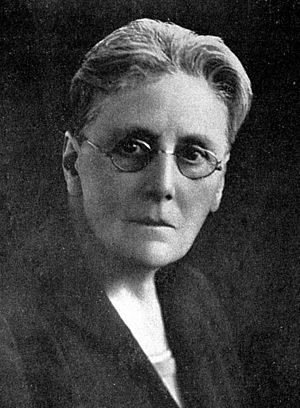Ethel Bentham facts for kids
Quick facts for kids
Ethel Bentham
|
|
|---|---|

Ethel Bentham
|
|
| Member of Parliament for Islington East |
|
| In office 30 May 1929 – 19 January 1931 (Died in office) |
|
| Prime Minister | Stanley Baldwin |
| Preceded by | Sir Robert Tasker |
| Succeeded by | Dame Leah Manning |
| Personal details | |
| Born | 5 January 1861 |
| Died | 6 January 1931 (aged 70) |
| Nationality | British |
| Political party | Labour |
| Education | Alexandra School and College London School of Medicine for Women |
| Occupation | Medical doctor and politician |
Ethel Bentham (born January 5, 1861 – died January 19, 1931) was an amazing woman from the United Kingdom. She was a doctor who cared deeply about people's health. She was also a politician and a suffragist, meaning she worked hard to get women the right to vote.
Ethel was born in London. She studied at Alexandra School and College in Dublin. Later, she trained to be a doctor at the London School of Medicine for Women and the Rotunda Hospital.
Early Life and Education
Ethel Bentham was born in London. Her father, William Bentham, worked for an insurance company. Her mother was Mary Ann Hammond. Ethel grew up in Dublin, Ireland.
Her father was a Justice of the peace, which is like a local judge. Ethel often went with her mother on trips to help people in the poorer parts of the city. These trips made her want to become a doctor and help others.
She studied medicine at the London School of Medicine for Women from 1890 to 1893. In 1894, she learned about midwifery (helping with childbirth) at the Rotunda Hospital in Dublin. She also trained in hospitals in Paris and Brussels, where she earned her medical degree in 1895.
Ethel's Career
Medical Work
After finishing her studies, Ethel worked in hospitals in London for a short time. Then, she became a family doctor in Newcastle upon Tyne and Gateshead. She worked with Dr Ethel Williams, who was the first female doctor in Newcastle. Dr. Williams was also a strong supporter of women's voting rights.
Ethel joined the Labour Party in 1902. This party works to improve the lives of working people. She also joined groups like the Fabian Society, which aimed for social change.
In 1909, Ethel moved back to London. She opened her own medical practice in North Kensington. She became an expert in treating childhood bedwetting. She also believed in what we now call "socialized medicine." This means that healthcare should be available to everyone, not just those who can afford it.
In 1911, Ethel helped start a special clinic for mothers and babies in North Kensington. This clinic was the first of its kind in the country. It offered both medical treatment and helpful advice. Ethel was the main doctor there and even helped pay for its costs.
Political Work
Ethel Bentham was very active in politics. In 1912, she was elected to the Kensington Borough Council. This meant she helped make decisions for her local area. She held this position until 1925.
After World War I, Ethel became one of the first women to be appointed as a magistrate. This meant she worked in children's courts, helping young people.
Ethel also became a member of the National Executive Committee of the Labour Party. This is a very important group that helps lead the Labour Party. She was on this committee for many years.
Ethel tried to become a Member of Parliament (MP) several times. An MP is someone elected to represent their local area in the country's main government, the House of Commons. Finally, in the 1929 general election, she won!
She became the fifteenth woman to be elected as an MP in the UK. She was also the first woman MP who was a Quaker (a type of Christian faith) and the first woman doctor to become an MP. At 68 years old, she was the oldest woman elected to Parliament at that time.
Ethel Bentham served as an MP for two years. She spoke in Parliament about important issues, including mental health.
She passed away on January 19, 1931, shortly after her 70th birthday. Her death led to a special election, and another woman from the Labour Party, Leah Manning, was elected to take her place.
Private Life
Ethel Bentham never married and did not have children. She was raised in the Anglican faith, but in 1920, she became a member of the Quaker community in London.
 | Ernest Everett Just |
 | Mary Jackson |
 | Emmett Chappelle |
 | Marie Maynard Daly |

